Insomnia can be really tough and stop you from getting the sleep you need. But, there are many ways to help you sleep better. This guide will cover different remedies, tips, and natural aids for sleep. These are supported by science and expert advice.
By learning about insomnia and its causes, you can find ways to sleep better. This can make you feel refreshed and ready for the day.
Key Takeaways
- Discover a variety of effective insomnia remedies and natural sleep aids to improve your sleep quality
- Learn how to establish good sleep hygiene practices and create a sleep-friendly environment
- Explore the benefits of cognitive behavioral therapy, relaxation techniques, and other evidence-based strategies for insomnia relief
- Understand the importance of exercise, sleep tracking, and professional help when needed
- Implement a holistic approach to address the root causes of your sleep disturbances and achieve restful, restorative sleep
Understanding Insomnia: Causes and Symptoms
Insomnia makes it hard to fall or stay asleep, affecting our well-being. To tackle this sleep issue, we need to know its causes and symptoms. This includes both acute and chronic insomnia.
Distinguishing Between Acute and Chronic Insomnia
Acute insomnia is short-term, triggered by stress or changes in routine. It usually lasts a few days or weeks. Chronic insomnia, however, is long-term. People with it struggle to sleep for at least three nights a week, for over three months.
Identifying Underlying Factors Contributing to Sleep Disturbances
Many things can lead to insomnia, such as:
- Stress and Anxiety: Stress from work, relationships, or life can make sleeping hard.
- Medical Conditions: Health issues like chronic pain, breathing problems, or hormonal changes can affect sleep.
- Lifestyle Habits: Irregular sleep patterns, too much caffeine or alcohol, and using devices before bed can disrupt sleep.
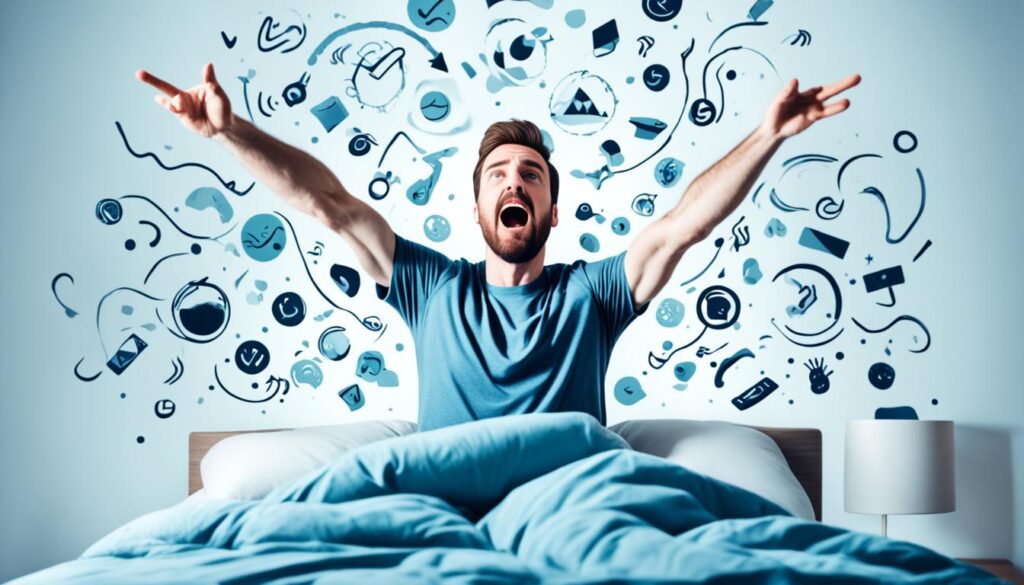
Establishing Good Sleep Hygiene Practices
Healthy sleep hygiene is key to better sleep. Having regular sleep habits and a good sleep environment helps your body rest well. These habits lead to more restful sleep.
Keeping a regular sleep schedule is important. Go to bed and wake up at the same time every day, even on weekends. Avoid napping during the day to keep your sleep patterns steady.
Your sleep environment should be calm and comfy. Make sure your bedroom is cool, dark, and quiet. Use a good mattress and pillows. Don’t use screens (like TVs, computers, and phones) before bed because they can mess with your sleep.
Also, have a calming routine before bed. Do relaxing things like reading, stretching, or taking a warm bath. Stay away from exciting activities or caffeine before bedtime.
“The key to better sleep is creating a consistent and soothing environment that allows your body to naturally transition into a restful state.” – Dr. Sarah Johnson, Sleep Specialist
Focus on these sleep hygiene tips to improve your sleep. Small changes can greatly help your sleep health and overall well-being.
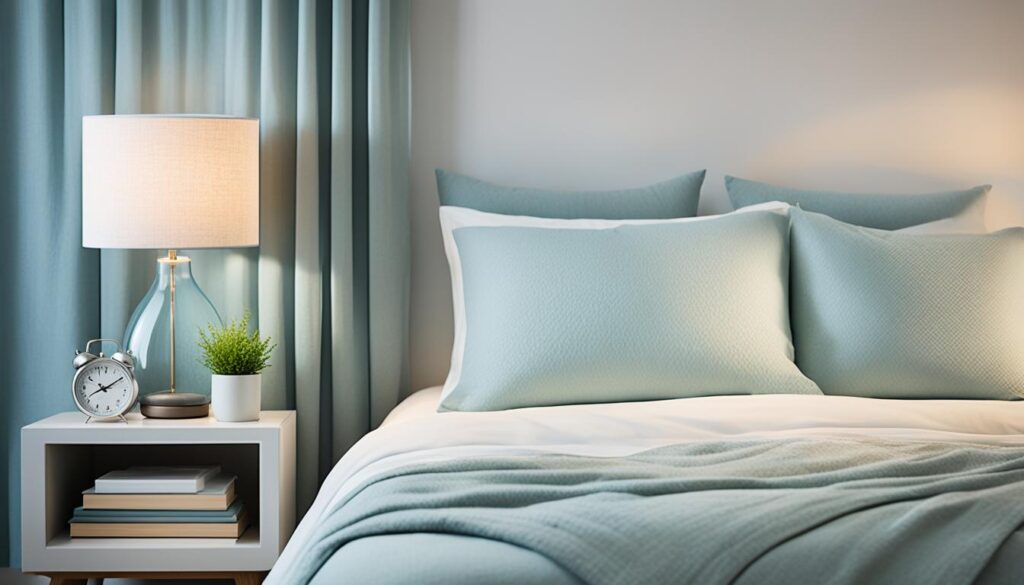
insomnia remedies, sleep tips, natural sleep aids, insomnia cure
Many people look for natural ways to sleep better. They try melatonin supplements and herbal teas. These options can help fix the main causes of insomnia and make sleep more relaxing.
Melatonin Supplements: Nature’s Sleep Regulator
Melatonin is a hormone our body makes. It helps control our sleep and wake cycles. Taking melatonin can help people with insomnia. It resets the body clock, making it easier to fall and stay asleep.
Melatonin supplements are safe and great for those with jet lag or changing sleep patterns.
Herbal Teas for Relaxation and Better Sleep Quality
Herbal teas are great for sleep because they calm you down. Chamomile tea helps with anxiety and inflammation, making sleep better. Valerian root tea works like some sleep medicines but doesn’t have their risks.
Using melatonin and herbal teas at night can help you sleep better naturally.

Cognitive Behavioral Therapy for Insomnia (CBT-I)
Cognitive Behavioral Therapy for Insomnia (CBT-I) is a proven way to help people sleep better. It focuses on the thoughts and actions that affect sleep. By changing these, people can sleep more soundly and wake up feeling refreshed.
Addressing Negative Thought Patterns and Beliefs About Sleep
Many people with insomnia have negative thoughts about their sleep. Cognitive behavioral therapy for insomnia works to change this. It teaches patients to notice and question these negative thoughts.
With CBT-I, people learn to:
- Spot thoughts that make insomnia worse, like thinking the worst or expecting failure.
- Swap these bad thoughts with more realistic and helpful ones.
- Find ways to deal with stress and anxiety that affect sleep.
CBT-I helps people take charge of their sleep. It leads to better sleep patterns and long-term relief from insomnia.
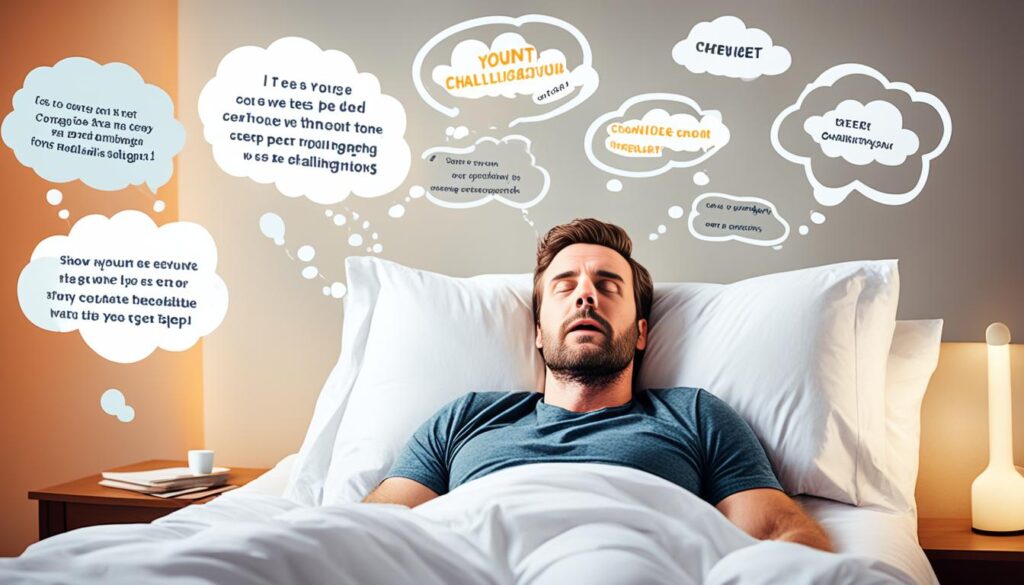
Many studies show that cognitive behavioral therapy for insomnia works well. It helps people fall asleep faster, sleep more soundly, and feel happier with their sleep. It’s often as good as, or even better than, sleeping pills for managing insomnia over time.
Relaxation Techniques for Unwinding Before Bedtime
Using relaxation techniques before bed can make it easier to fall asleep and stay asleep. I’ll show you how deep breathing and progressive muscle relaxation can calm your mind and body. This can lead to a more restful night’s sleep.
Deep Breathing Exercises
Deep breathing is a simple yet effective way to relax and get ready for sleep. By taking slow, deep breaths, you activate your body’s rest response. This lowers your heart rate, blood pressure, and stress levels. It makes falling asleep easier.
- Sit or lie down in a comfy spot, close your eyes, and breathe in deeply through your nose, letting your belly expand.
- Hold the breath for a few seconds, then slowly breathe out through your mouth, letting your belly go back down.
- Do this slow, deep breathing for 5-10 minutes, paying attention to how the air moves in and out of your body.
Progressive Muscle Relaxation
Progressive muscle relaxation is great for unwinding before bed. It involves tensing and relaxing different muscle groups in your body. This helps reduce physical tension and mental stress.
- Begin by tensing your toes, hold for a few seconds, then release and feel the tension go away.
- Move up your body, tensing and releasing muscles in your calves, thighs, abdomen, chest, arms, and finally your face and head.
- When you release each muscle group, notice how relaxed you feel and let your body sink deeper into your bed.
Adding these relaxation techniques to your bedtime routine can help you relax, reduce stress, and get ready for a good night’s sleep.

Sleep-Friendly Environment: Optimizing Your Bedroom
Creating a sleep-friendly environment is key for good sleep. The sleep environment greatly affects our sleep quality. So, making your bedroom right is important for better sleep habits.
Comfortable Bedding, Temperature Control, and Minimizing Light and Noise
Getting comfortable bedding can really help your sleep environment. Pick a mattress that’s both comfy and supportive. Make sure your pillows fit your sleep style. Keeping the room at 65 to 70 degrees Fahrenheit is also good for sleep.
Also, it’s important to keep your room dark and quiet. Use blackout curtains or blinds to block out light. And think about using a white noise machine or earplugs to keep out noise.
| Sleep Environment Component | Recommendation |
|---|---|
| Mattress | Comfortable and supportive |
| Pillows | Appropriate size and firmness for sleeping position |
| Room Temperature | 65 to 70 degrees Fahrenheit |
| Lighting | Use blackout curtains or blinds to minimize external light |
| Noise | Use a white noise machine or earplugs to mask disruptive sounds |
By making your bedroom comfy and sleep-friendly, you’re setting up for a great night’s sleep. You’ll wake up feeling refreshed and ready to go.
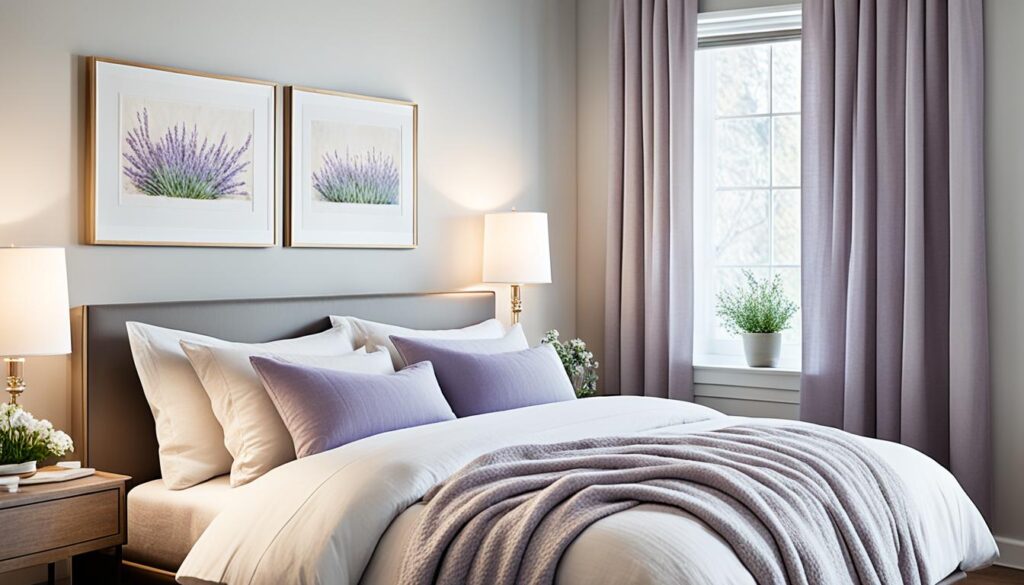
Incorporating Exercise and Physical Activity
Regular exercise can greatly improve our sleep quality. Studies show that different exercises like aerobic workouts, strength training, and yoga help us sleep better. By understanding how exercise affects sleep, we can use it to fight insomnia and get better rest.
Exercise helps reduce stress and anxiety, which can disrupt sleep. Physical activity releases endorphins, making us feel happier and more relaxed. This helps us relax before bed, making it easier to fall and stay asleep.
Some exercises, like walking, jogging, or cycling, improve sleep quality. These activities raise our body temperature, which then drops as we cool down. This signals our brain it’s time to rest and recover, improving our sleep cycles.
The best time to exercise is usually a few hours before bed. This helps our body relax and prepares us for sleep without messing with our sleep cycle. But, everyone is different. Some might prefer gentle exercises like yoga or stretching right before bed for better sleep.
Adding exercise to your daily routine can greatly improve your sleep and fight insomnia. Try different exercises and find what works best for you. This can help you sleep better and improve your health overall.

Sleep Tracking Apps and Devices
Today, we have many sleep tracking apps and devices. They give us insights into our sleep patterns. These tools help us check our sleep quality, find ways to get better sleep, and make smart choices for better sleep.
Monitoring Sleep Patterns and Identifying Areas for Improvement
Sleep tracking apps and devices use sensors and algorithms to track our sleep. They look at sleep duration, sleep stages, heart rate, and movement. This helps us understand our sleep habits and spot any issues that might be affecting our sleep quality.
Apps like FitBit, Apple Health, and Sleep Cycle track our sleep patterns. They give us tips to improve our sleep. These apps have features like sleep cycle analysis, sleep stage monitoring, and smart alarms. These alarms wake you up when you’re in a light sleep phase, making mornings easier.
Devices like wearable fitness trackers and smart mattresses give us more details about our sleep. They check our breathing patterns, body temperature, and other signs to show us how well we’re sleeping. This helps us find ways to sleep better.
| Sleep Tracking App | Key Features | Compatibility |
|---|---|---|
| Fitbit Sleep Tracking |
|
|
| Apple Health |
|
|
| Sleep Cycle |
|
|
Using sleep tracking apps and sleep tracking devices helps us take charge of our sleep monitoring. This leads to better sleep quality, which is good for our health and well-being.

Weighted Blankets: A Soothing Embrace for Better Sleep
Many people struggle with insomnia and sleep problems, making it hard to get a good night’s rest. But, more and more folks are finding relief with weighted blankets. These blankets are becoming popular for helping improve sleep quality and easing insomnia symptoms.
Weighted blankets work by using deep pressure stimulation. This pressure feels like a hug, which helps release serotonin and dopamine. These are chemicals that make us feel good. This can help you relax, lessen anxiety, and improve your sleep quality.
“Weighted blankets have been a game-changer for my sleep. I used to struggle with falling and staying asleep, but now I look forward to wrapping myself in the comforting weight every night.”
Weighted blankets also help with sleep disorders like insomnia, restless leg syndrome, and autism-related sleep issues. They provide a steady, comforting pressure. This can make you feel secure and grounded, leading to better sleep.
When picking a weighted blanket, make sure it matches your weight, usually 5 to 30 pounds. The weight should be spread out evenly for the best comfort and effect. With the right blanket, you can enjoy the calming effects of deep pressure stimulation and better sleep every night.
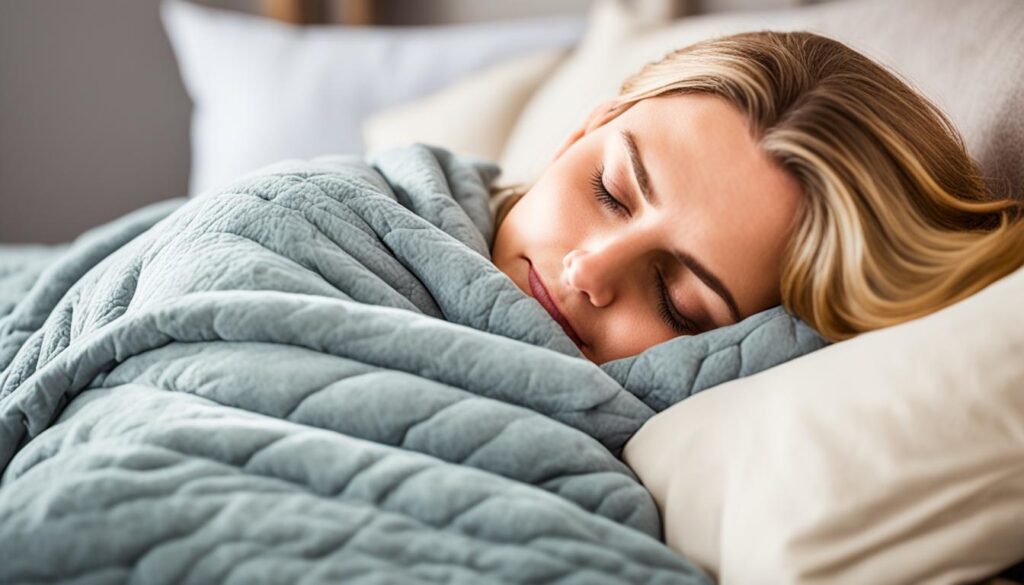
| Benefits of Weighted Blankets | How Weighted Blankets Work |
|---|---|
|
|
White Noise Machines and Soothing Sounds
Getting a good night’s sleep can be hard, especially with noises that keep you awake. Luckily, white noise machines and soothing sound generators can help. They mask the sounds that disturb your sleep, making it more peaceful.
Masking Disruptive Noises for Uninterrupted Sleep
White noise machines make a constant sound that covers up other noises like traffic or snoring. This method, called “noise masking,” helps your brain ignore these sounds. It makes it easier to fall asleep and stay asleep all night.
These devices also offer sounds from nature, like rain or ocean waves. These sounds create a calming atmosphere. They help block out external noises and lead to deeper sleep.
| Feature | White Noise Machines | Soothing Sound Generators |
|---|---|---|
| Sound Source | Generates a consistent, neutral “white noise” sound | Offers a variety of natural, ambient sounds (e.g., rain, waves, wind) |
| Masking Ability | Highly effective at blocking out disruptive noises | Provides a relaxing, immersive soundscape to mask distractions |
| Customization | Often have adjustable volume and tone controls | May allow users to customize sound mixes and volume levels |
| Portability | Compact, battery-powered devices for easy travel | Range from small, portable units to larger, stationary models |
Choosing a white noise machine or a sound generator can help fight insomnia. They mask disturbing noises and create a calm space. This way, you can get the sleep your body needs.
Mindfulness and Meditation for Insomnia Relief
Adding mindfulness and meditation to your daily life can help with insomnia and improve sleep. These methods reduce stress, calm the mind, and help you relax for better sleep.
Mindfulness means being fully in the moment and focusing on your breath or body sensations. It helps you release worries and anxious thoughts that keep you awake. Studies show that regular mindfulness practice lowers stress and enhances sleep quality.
Meditation is training your mind to focus and control your thoughts. It helps you quiet your mind, which is key to managing racing thoughts that cause insomnia. There are many meditation techniques, like guided meditations, that can help with sleep issues.
- Incorporate mindfulness exercises, such as body scans or breath awareness, into your bedtime routine.
- Try meditation apps or online resources to guide you through relaxing, sleep-promoting practices.
- Experiment with different techniques to find the ones that work best for you and your sleep needs.
Adding mindfulness and meditation to your life can change how you deal with insomnia and get better sleep. With time and regular practice, these methods can bring you calm and peace. This can lead to more restful nights.
Seeking Professional Help When Needed
Natural remedies and self-care can help with insomnia, but sometimes you need professional help. If you can’t sleep well even with these methods, talk to a sleep specialist or your healthcare provider. They can give you the right insomnia treatment.
A sleep specialist, like a board-certified sleep doctor, can check your sleep issues deeply. They might do a sleep study to find out what’s causing your insomnia. Then, they can make a plan just for you to fix your sleep problems.
Consulting with Sleep Specialists and Healthcare Providers
Your main doctor can also help with your insomnia. They can check for health problems like sleep apnea, hormone issues, or mental health issues that might be affecting your sleep. They can also suggest sleep specialists or other experts in sleep disorders.
- Comprehensive assessment of sleep difficulties
- Identification of underlying medical conditions or sleep disorders
- Personalized treatment plan based on individual needs
- Referrals to sleep specialists or other healthcare providers
Working with a sleep specialist or your healthcare provider means you get the best insomnia treatment. Don’t wait to get help if your self-care isn’t working.
Conclusion
As we wrap up our look at insomnia remedies, sleep tips, natural sleep aids, and insomnia cure strategies, we see a big picture. A full approach is key to better sleep. We’ve looked at the causes of insomnia, relaxation techniques, and how to make your bedroom sleep-friendly.
One big point is the importance of personalizing your approach. While many insomnia remedies and sleep tips help many people, it’s vital to pick what works for you. You might try natural sleep aids like melatonin, meditation, or making your bedroom sleep-ready. The goal is to find what suits you best.
Finding the right insomnia cure takes time and patience. Keep working on your sleep habits and be open to new ideas. With persistence, you’ll find the right way to sleep well. This holistic method can greatly improve your health and happiness.

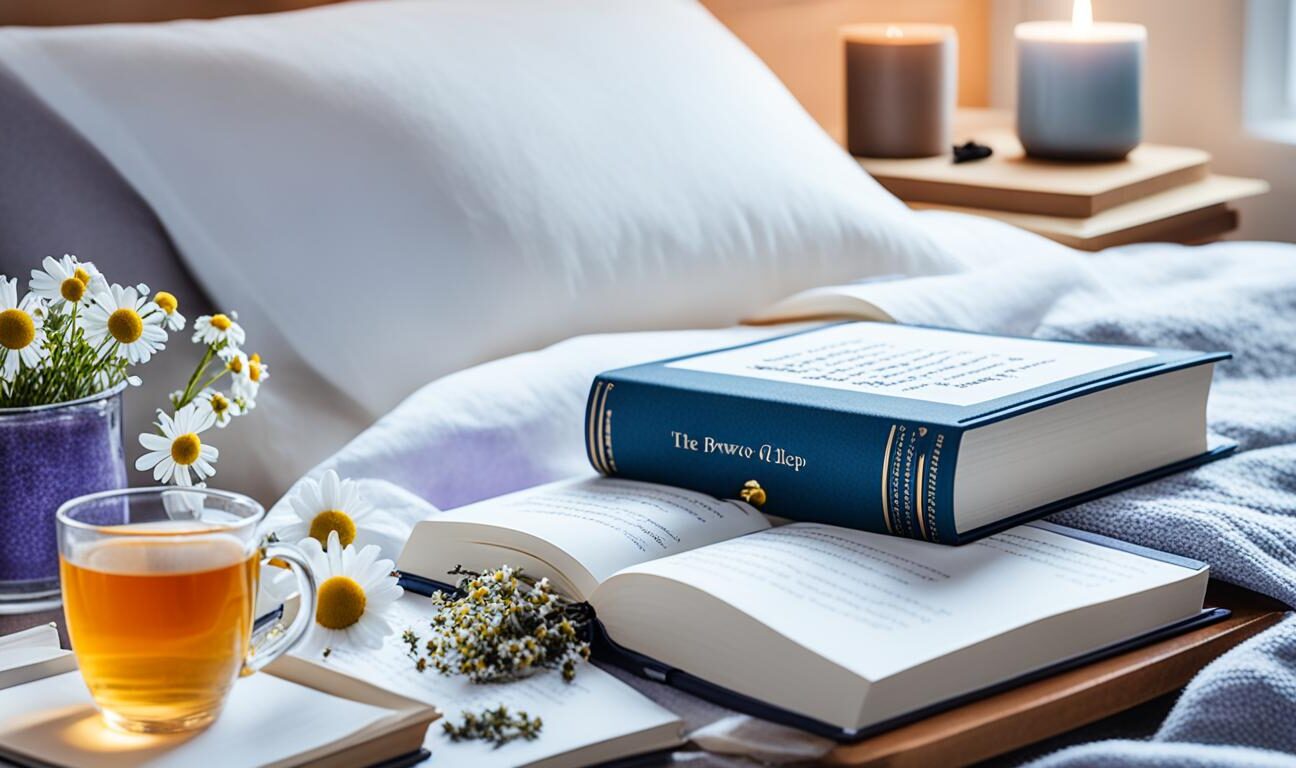

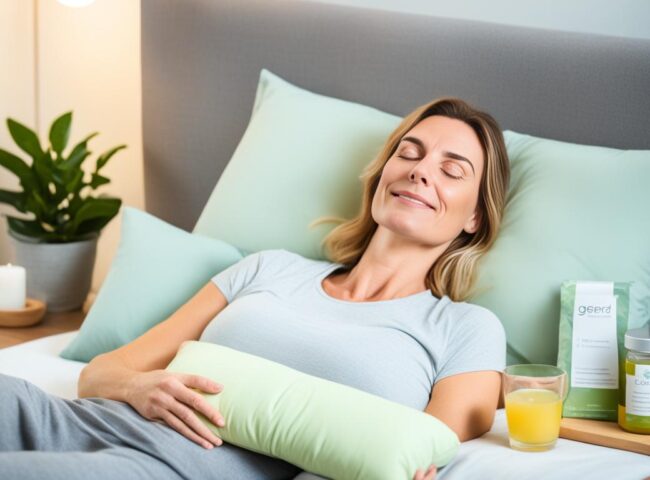


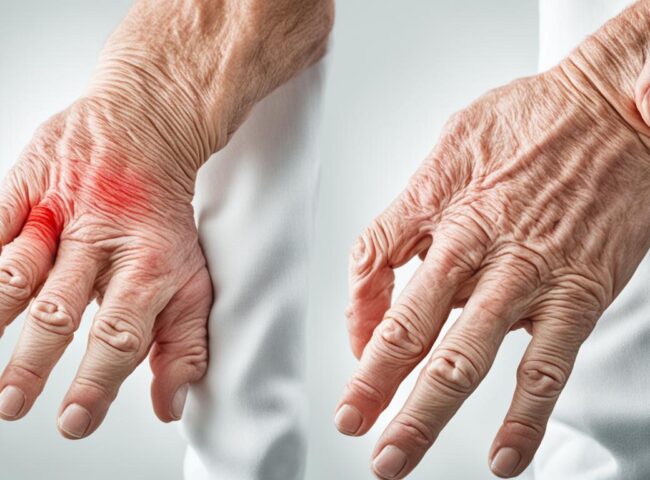
Leave feedback about this